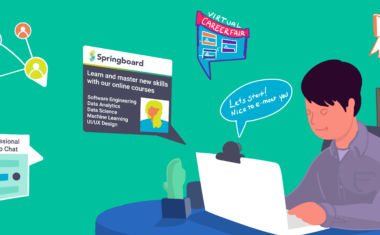The Death of the College Degree: How the Digital Skills Gap Is Turning Higher Ed On Its Head

College degrees were once seen as a ticket to the middle class, guaranteeing graduates approximately $900,000 more in median lifetime earnings than their non-credentialed counterparts. But as tuition costs continue to climb and top tech companies drop degree requirements, many would-be college students are reconsidering whether to sink time and money into earning a degree.
College enrollment figures from the National Student Clearinghouse Research Center show enrollment has declined 4.7% compared to last spring. Generation Z, digital natives born after 1997, have a particular distaste for college. A recent survey on Intelligent.com found that 90% of Gen Zers are passing on college and educating themselves through alternative means such as Youtube videos, certification programs, and internships.
Affordability is currently the biggest roadblock to higher education. In fact, 34% of young adults who aren’t enrolled in college say it’s because they can’t afford it. While most universities implemented tuition freezes during the pandemic, the costs of college will begin creeping up again by an average of 3.7% in the coming year.
A Divide Is Growing Between the Higher Ed Haves and Have-Nots
There’s a growing dichotomy in higher ed between those who can afford a college education and those forced to go without altogether. Public universities and community colleges have lost the most enrollments since the pandemic, while elite universities have continued to attract an overflow of applicants.
Even so, degrees remain instrumental to employment. According to Jobscan, 99% of Fortune 500 companies use an Applicant Tracking System (ATS)—HR software designed to shortlist resumes according to desired keywords, qualifications, and years of experience. Most ATS software captures your highest level of education, making it virtually impossible to get your resume in front of a hiring manager if the system has been calibrated to screen for a degree—especially for primitive software that doesn’t employ fuzzy logic (for example, knowing that “William” = “Bill”).

“Having a degree is a poor proxy for ability because it just matters that you have one; it doesn’t matter what you studied,” said Sarah Savage, a content data analyst at MOOC provider EdX and a graduucessaste of Springboard’s Data Analytics Career Track.
Savage considers herself a “non-traditional” job seeker because although she has a master’s degree, she studied completely unrelated subjects (theater and elementary education) to her current profession as a data analyst. “All of my current skills come from the Springboard program, but even so, having a degree still puts me at an advantage,” she says.
However, many students are realizing that four-year college courses tend to be heavy on theory while being lean on the practical experience employers covet. Less than a year after earning a degree in computer science, Abdelkareem Elshareif enrolled in Springboard’s Software Engineering Career Track because he was struggling to land a job. While his college courses instilled a solid foundation in computer science fundamentals, he had no opportunity to work on hands-on projects or learn about the technology stacks being used in the industry.
“When you’re studying for a computer science degree, you have to go above and beyond to create things you can show on a portfolio,” says Elsharief, now a software engineer at Bread Financial. “Most of the projects and assessments are not user-facing—they’re mostly text-based, logic-based, or involve mathematical operations.”
College Degrees Still Hold Weight In Fields Where Job-Seekers Must Meet Minimum Education Requirements
The ‘degree or no degree’ debate tends to compare college graduates to counterparts who only have a high school diploma, without considering alternative credentials such as certifications, vocational degrees, or internship experience. A new study from Switchup found that the Big Five tech companies—Apple, Microsoft, Facebook, Google, and Amazon—hired bootcamp grads at the same rate as college graduates.
However, those trying to break into credential-heavy fields must meet minimum education requirements. According to a recent report from Burning Glass Technologies, 39% of data scientist and advanced analyst roles require candidates to have a master’s degree or higher. This is because data scientists rely on a gamut of skills—mathematics, advanced statistics, machine learning, and programming—to succeed in their roles. A majority of data scientists (68%) have a college-level degree, according to the State of Data Science 2021 report.
Furthermore, those with a degree in a technical field have a leg-up over those who majored in unrelated disciplines—but all is not lost for aspiring data professionals switching from a non-technical career. Newly credentialed data scientists with no technical background are typically advised to start in a data analyst role—which has a more limited scope and pays significantly less—and then work their way up to a data science role by polishing their skills in Python, R, and machine learning algorithms.
When Springboard data science alum Kristen Colley started hunting for her first data job in 2019, most companies were not interested in her data science credentials. “When I started rebranding myself as a data analyst with the ability to handle machine learning problems, that’s when the opportunities started coming in,” says Colley, a Level III data analyst at DISH Network who has a bachelor’s degree in economics.
While education is important, experience with programming languages, tooling, and problem-solving skills ultimately count for more than a degree alone.
“One of the main things I look for when hiring a data scientist is an analytical mindset, problem-solving ability, and a never-give-up attitude,” says Dipanjan Sarkar, lead data scientist at Schaffhausen Institute of Technology (SIT) Academy in Switzerland and a mentor at Springboard.
“Book-learned knowledge or knowledge from a course isn’t enough; if a problem is challenging or ambiguous, can they put on their thinking cap and come up with an innovative solution?”
Generally speaking, higher education tends to be more important for entry-level professionals. As you progress in your career, job experience and the acquisition of new skills carry more weight.
The Digital Skills Gap Is Turning Higher Ed On Its Head
Faced with a tech labor shortage, companies are axing degree requirements and ramping up employee training programs. In fact, 79% of CEOS are concerned about employees’ lack of essential skills and say it’s a threat to business growth—suggesting that even those with degrees lack the essential skills for a digital-first future. The most crucial skills workers are missing include coding, basic data analytics, creative design, social media marketing, and knowledge of collaborative technologies like Slack and Microsoft Teams.
In order to keep up, many professionals are taking short courses in a piecemeal fashion. During the pandemic, Salesforce saw a 40% increase in sign-ups for Trailhead, the company’s free platform for workplace skills education. LinkedIn Learning reported a threefold increase in time spent on its platform.

According to Wiley’s Digital Skills Gap Index, the most important 21st-century workplace skill is problem-solving, and the most important technical skill is data analytics—and that’s just for the jobs that are available today.
A new report published by Dell Technologies posits that 85% of jobs that will exist in 2030 haven’t been invented yet.
“The pace of change will be so rapid that people will learn ‘in the moment’ using new technologies such as augmented reality and virtual reality,” Dell Technologies said in the report. “The ability to gain new knowledge will be more valuable than the knowledge itself.”
How do you prepare for a job that doesn’t exist yet? If you’re entering a four-year degree program, consider that by the time you graduate, the skills you’ve learned may be outdated.
There are also emerging metaverse professions like blockchain engineering to consider—professionals who design, develop, and implement distributed blockchain networks—for which there is very little formal training. The same goes for UX design, which was founded in 1993 by Apple designer Don Norman. Nearly 30 years later, UX-specific degree programs remain thin on the ground, with many would-be designers opting for tangential majors like psychology, human-computer interaction, and anthropology.
The metaverse will only worsen the skills gap by increasing the demand for professionals who are proficient in digital currencies, virtual reality platforms, gaming, machine learning, and 3D graphics. It could also radically alter the way we learn. Manufacturing companies have long used augmented and virtual reality to train workers to use equipment. The metaverse could standardize this type of learning environment, with AI-enabled digital coaches on hand to assist employees with training.
“In the metaverse, every object—a training manual, machine, or product, for example—could be made to be interactive, providing 3-D displays and step-by-step “how-to” guides,” Mark Purdy wrote in an article for Harvard Business Review.
Meanwhile, VR-facilitated roleplaying can be used to teach soft skills at scale using real-world scenarios, such as “convincing a difficult prospect” or “a challenging employee conversation.”
Employers Are Reconsidering Their Bias Towards Degrees—Albeit Slowly
The proportion of jobs that require degrees is diminishing—another byproduct of the talent shortage. Researchers from Burning Glass Technologies analyzed millions of online job listings, looking for four-year college degree requirements and trends. In 2017, 51 percent required the degree. By 2021, that share had declined to 44%.
In fact, non-degreed workers in certain fields that value experience over education are earning higher salaries. According to new research from leading job search engine Adzuna, infrastructure consultant positions have an average market value of $168,814 with no degree requirement vs. $52,166 with a degree requirement. Software development manager positions are offering $205,921 without a college education requirement compared to offering lower average earning potential at $154,581 with an education requirement.
“Job seekers don’t need a degree anymore to earn a big pay packet, which is welcome news for those who can’t shoulder the cost of attending college,” says Paul Lewis, chief customer officer at Adzuna.
“A company that puts emphasis on skills over formal credentials in their hiring process will create a better foundation and culture of values and a more diverse, well-rounded set of employees that will become a competitive advantage down the line.”
However, the data also shows that certain roles still require degrees, and across all industries, job seekers with related degrees earn 40% more on average than those without. The average earning potential for cybersecurity consultants with a degree is $156,143 vs. $51,234 without a degree, while degreed and non-degreed e-commerce managers earn $77,987 vs. $47,408 respectively.
Upskilling Is Putting Pressure on Employers to Re-Educate Workers
The pace of technological change is reaching a point where on-the-job training may be more effective at meeting an organization’s unique talent needs than offering tuition reimbursements for employees to pursue an MBA or other degree.
Already, MOOC (Massive Open Online Courses) providers like Coursera, EdX, and Udacity have partnered with employers to co-create courses teaching digital skills necessary for the modern workforce. This not only enables companies to fill talent gaps but also improves the classroom-to-workforce pipeline for learners, many of whom struggle to relate their skills and education to the exasperatingly specific bullet points listed on a job description.

Springboard recently partnered with Hewlett Packard to teach its global marketing team data literacy skills by offering an eight-week course called Data-Driven Strategic Thinking, which is similar to a mini-MBA. The course is designed to help career marketers learn how to pull key insights from complex data insights and use them in their day-to-day decision-making.
“A lot of people on the team have been marketers for their entire career, and it’s only in the last few years that marketing has become more data-driven,” says Jon Butler, associate director of partnerships at Springboard for Business, a new division within Springboard that runs corporate training programs. “This program is a win-win because it equips employees with digital skills while also allowing the company to avoid the costs of having to hire externally.”
Springboard has also been partnering with key employers to improve the classroom-to-workforce pipeline and give qualified graduates access to job opportunities. Students enrolled in the UI/UX Design Career Track, for example, are required to complete a four-week internship with a company to graduate. Springboard then matched groups of students with startups that need design help. Students have the opportunity to not only work on real-world problems—improving user flows, website design, running A/B tests, and so on—but collaborate with other designers.
In 2019, Springboard partnered with Affirm to place graduates from its Software Engineering Career Track in Affirm’s Upward Program, an apprenticeship for software engineers. The Employer Partnerships Team at Springboard has also partnered with organizations including Amazon and Facebook to help graduates who have been out of the workforce land roles through return-to-work programs–typically a 16-week paid virtual returnship culminating in the opportunity to land a full-time role.
Looking at the success of online bootcamps and courses, many universities are now trying to adopt a similar approach by launching their own bootcamps and online certification courses. University bootcamps aim to combine the name recognition and network of a traditional university with the industry savvy and ed-tech infrastructure of a bootcamp.
Other trends suggest the future of education is modular. According to a recent report by Citrix, 82% of employees and 62% of HR directors said they believe that workers will need to reskill or upskill at least once a year to maintain a competitive advantage in a global job market.
With their backs against the wall, employers are beginning to shoulder the burden of educating their workforce rather than mulishly holding out for “perfect” hires who tick every box.
Some employers want to diversify their talent pool by instilling digital literacy in populations that tend to lack it the most. In February, Google announced a $100 million fund for a skills training program for low-income Americans. Unlike a college education, student loans for this program carry no interest, and students will begin repaying only if they get a job that pays at least $40,000 a year. The program will train students in IT support, data analytics, project management, and UX design. The tech giant also announced it would contribute $10 million to the AARP Foundation with the aim of training older adults in digital skills.
Still, other firms are intent on upskilling their existing workforce and promoting from within. In 2019, PwC announced a $3 billion fund for employee job training. The company launched the Digital Fitness App and the Digital Lab to teach employees STEM skills. PwC’s Digital Accelerator training program for employees focuses on specialties such as automation, AI, data, and digital storytelling. Meanwhile, Accenture invested nearly $1 billion in 2021 alone to reskill its workforce, while Amazon Launched Upskilling 2025 to prepare workers for a more digitized workplace. IBM was one of the first companies to launch an apprenticeship program in 2017 (an estimated 20% of its employees do not have a degree).
Employers Are Starting to Realize the Drawbacks of Snubbing “Non-Traditional” Candidates
Despite loosening minimum education requirements and pivoting to skills-based hiring, employers continue to complain about how difficult hiring is. Unrealistic requirements, “phantom” job postings, an overreliance on referrals, and an overemphasis on “passive candidates” (those who are currently employed and not seeking a new role) are just a few of the reasons why the talent pipeline is broken.
However, employers are starting to realize the drawbacks of snubbing “non-traditional” candidates. According to Opportunity@Work and Accenture, as many as 30 million of these workers have the skill sets required for higher-paying jobs but are held back by degree requirements.

Bank of America runs an internal program called Pathways for job candidates without college degrees to be considered for entry-level positions and offered on-the-job training, including tuition reimbursement for college.
“I’m seeing a large spike in job opportunities that support those from very unconventional backgrounds,” says Nadeja Adams, senior manager of employer partnerships at Springboard.
“Companies are making the case that candidates who have gone to trade school or earned a certification are just as valuable as someone with a university degree when you’re talking about skills-based roles.”
When asked in a 2014 interview about what university degrees he looks for in a resume, Elon Musk said a degree is not a barrier to someone “achieving great things” (or getting hired at Tesla).
But what happens when a job applicant with no degree goes up against another candidate who has one, all other factors being equal? Does the college degree still prevail? It depends on a range of factors—for example, the seniority of the role, the quality of the applicant’s portfolio, their prior work experience, and the company’s general commitment to diversity hiring.
Savage, who spent over a decade working as a teacher and administrator, says bootcamps do a better job of simulating real-world conditions and preparing candidates to deal with ambiguity and learn at a faster pace—especially when it comes to data science or data analytics.
“The datasets you work within a school project are clean and simple and the conclusions are often pretty straightforward,” she says. “But that’s just not how it works in the real world. I have seen young people really struggle with that because that’s not how academia looks at things.”





